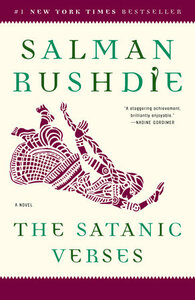Take a photo of a barcode or cover
I loved this novel. It was compelling from beginning to end with the wit of both dickens and umberto Eco along with plenty of sharp observations. Rushdie also wove seemingly disparate characters and narratives into a natural and seamless whole.
I really wanted to like this book with all of its history but I just didn’t understand it. Very hard to follow.
Had I been less of an ignoramus regarding both India and Islam I think this might've been a 5/5. As it is, I feel a lot probably went straight over my head, but it was en enjoyable read nonetheless, the kind of book you might want to sit down with and study for more than a couple of weeks.
adventurous
challenging
dark
emotional
reflective
Plot or Character Driven:
Character
Strong character development:
Yes
Loveable characters:
Complicated
Diverse cast of characters:
Yes
Flaws of characters a main focus:
Yes
Liked it a lot. But a difficult listen (even if the reader's s's hadn't been as bad as they were)--although the reader did a great job in accents and otherwise. Also I felt like I missed the beauty of Rushdie's language being unable to see the actual sentences. Good laughs and really made me wonder what the fuss was all about.
I get that this is a very artistic, convoluted, avant-garde, and social politically important book.
It’s just not very good. I get that books don’t need to be written in complete sentences. I get that authors can do whatever they want with concepts and characters and writing styles.
It’s just not fun to read, it’s a hodgepodge, and the writing is just a technical mess. I’d rather read something well written.
It’s just not very good. I get that books don’t need to be written in complete sentences. I get that authors can do whatever they want with concepts and characters and writing styles.
It’s just not fun to read, it’s a hodgepodge, and the writing is just a technical mess. I’d rather read something well written.
Find it quite unbelievable this deserved a fatwa. But as a non-believer, perhaps I missed the point. Or did they actually read it?! In fact I found it hard to fathom what it was about at all, despite the wonderful language and sentences
I picked up this book after Salman Rushdie was attacked last year. It took me forever to start reading it, and what felt like even longer to finish it. I wanted to read it primarily to see what people found so offensive to justify murder. I found a story that goes in many, many different directions. One of those directions pokes fun at the hypocrisy present in Islam; the same hypocrisy and idiosyncrasies that litter a lot of organized religion. Illuminating to read, and wild that something so benign cannot be tolerated. For the rest of the book, I think I would have understood it more if I had a better working knowledge of Abrahamic religions or Indian colonial history. As it stands, I think much of the book was probably lost on me, and I found it a bit of a slog to get through. That said, I'm glad I read it, even if it's a book I know I have no interest in reading again.
This was such a challenge! Which I kind of knew going into it haha. Sometimes it felt like Rushdie wrote a sentence out in plain English, then went back with a thesaurus (or his own made up words) just to make the sentence longer/harder to read.
But it’s a classic (and banned) for a reason. I love how Rushdie doesn’t have an outright point of view, he’d rather sit and watch the reader squirm over the central theme: what is the nature of evil?
Through several completely surreal storylines including a pilgrimage to Mecca, a plane crash over London, and a fictional desert oasis complete with satirical prophet, I was basically just hanging on for dear life. My key takeaway is that evil isn’t as far away as we think it is. There’s no reason why Gibreel becomes angel and Chamcha devil. We can try to assign moral value to their characteristics, but really we’re all fallible humans with the capacity for evil right below the surface.
But it’s a classic (and banned) for a reason. I love how Rushdie doesn’t have an outright point of view, he’d rather sit and watch the reader squirm over the central theme: what is the nature of evil?
Through several completely surreal storylines including a pilgrimage to Mecca, a plane crash over London, and a fictional desert oasis complete with satirical prophet, I was basically just hanging on for dear life. My key takeaway is that evil isn’t as far away as we think it is. There’s no reason why Gibreel becomes angel and Chamcha devil. We can try to assign moral value to their characteristics, but really we’re all fallible humans with the capacity for evil right below the surface.
Satanic Verses was a book I read for the controversy surrounding it. I was disappointed by the tedious narration and the unnecessary digressions and embellished subplots. It completely distracted the reader from the core plot. For much of the first half I was confused as to what the author was trying to do with the novel. Having read Rushdie once before I presumed all these loose ends would be tied in the end. But it wasn't. For one the entire bit about the Imam was left without conclusion. So was the Mahound storyline, which was concluded but the conclusion didn't merit the length the plot occupied in the story. So all these distracted the reader from the story and forced a kind of cloudy mysticism when there were none. So yeah I was definitely disappointed with the book.
Although at this point I must mention, that I was quite surprised that it was banned and fatwas calling for Rushdie's life were published for this content. Rushdie opened some very valid discourses and questions. And as far as the irreverent writing is concerned, it just manifests the insecurity of the fragility of believes that cannot be explained or proved. Otherwise I don't see the point of such an overreaction to the book.
I liked the arc of Saladin Chamchawala. I genuinely enjoyed reading his character arc (for he was the only character who seemed to have a distinct arc). His bits seemed natural and piqued my interest. Gibreel Fraishta's plotline was again, tedious, repetitive and a bit circular.
Although at this point I must mention, that I was quite surprised that it was banned and fatwas calling for Rushdie's life were published for this content. Rushdie opened some very valid discourses and questions. And as far as the irreverent writing is concerned, it just manifests the insecurity of the fragility of believes that cannot be explained or proved. Otherwise I don't see the point of such an overreaction to the book.
I liked the arc of Saladin Chamchawala. I genuinely enjoyed reading his character arc (for he was the only character who seemed to have a distinct arc). His bits seemed natural and piqued my interest. Gibreel Fraishta's plotline was again, tedious, repetitive and a bit circular.



